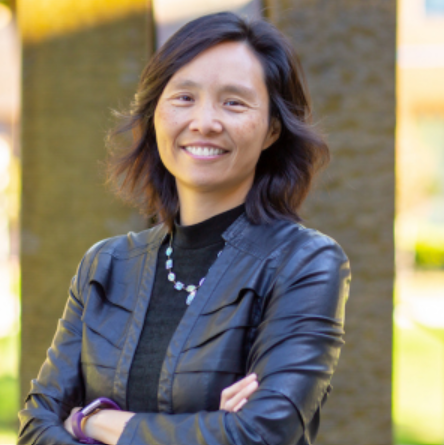Judy Wu is Associate Dean of the School of Humanities and Professor of History and Asian American Studies at the University of California, Irvine. Wu also serves as the director of both the Humanities Center and the Center for Liberation, Anti-Racism, and Belonging at the university. Prior to UC Irvine, Wu was a professor at Ohio State University from 1998 to 2015 in both the History and the Women’s, Gender, and Sexuality Studies departments. Wu’s research has focused on how individuals navigate intersecting social hierarchies, both forming identities through them and protesting them. Across three books, Dr. Mum Chung of the Fair-Haired Bastards: A Life of a Wartime Celebrity (2005), Radicals on the Road: Internationalism, Orientalism, & Feminism during the Vietnam Era (2013), and Fierce and Fearless: Patsy Takemoto Mink, First Woman of Color in Congress (2022), Wu examines key feminist figures and moments throughout the twentieth century.

Wu served as co-editor of Frontiers from 2012-2017 alongside Guisela Latorre. In 2012, Wu joined Latorre in applying to host Frontiers at OSU. Working with Latorre, Wu secured strong institutional support for the Journal through course releases, funding for graduate student assistants, and space for an editorial office. Wu continued in her co-editor role after moving to UC Irvine. She was familiar with the Journal as a foundational publication in women’s and gender studies that featured women of color scholarship and was engaging critically with its focus on the American west. Wu was excited to continue this legacy while also using the Journal to transform the academic community in different ways, such as the limitations of the academy’s existing categorization of labor. She pushed to have the Journal and its editorial labor given more institutional recognition, and she valued and promoted multiple types of submissions. Wu and Latorre also worked with the National Women’s Studies Association (NWSA) to provide more spaces for women of color scholarship and collaborative opportunities, including creating what is now the Women of Color Caucus-Frontiers Student Essay Award.
During her editorial tenure, Wu drew from her disciplinary background as a historian to develop multiple special issues for the Journal’s 40th anniversary. Wu and Latorre chose a special issue each year “to commemorate a significant event” from the 1970s including Roe v. Wade, Educational Equity Act, the United Nations International Women’s Year Conference, and the Combahee River Collective Statement (p. 1-2). These special projects highlighted the political movements and issues of this era while also exploring topics of transnational feminism, digital forms of scholarship, and the evolution of the field more broadly. She takes pride in this work continuing the political consciousness-raising mission of feminist scholarship and being part of the longer women of color tradition.
Another major accomplishment during these years was the Transnational Feminist Summer Institute in 2014. Wu was the main coordinator of this event. She envisioned it as “a summer camp for feminists” (Wu, 3) that would bring people together to nurture their scholarship through collaborative engagement with each other’s work. Students and faculty from across the country participated for a week at OSU. The Institute consisted of workshops and conversations around transnational feminism and the field of women’s studies broadly, and eventually several of the papers from the workshop were published in Frontiers. In her interview, Wu said “it was wonderful to be able to bring people together and to kind of create that sense of intellectual community” (Wu, 4). The Facebook page created for the Institute remained active for years after, showing how the event fostered this feminist community. The Institute also contributed to the overall mission of providing institutional recognition to a broader range of scholarly activities and works.
Read more about Professor Wu here.
Selected Quotes from Frontiers at 50 Oral History Interview
“Because I’m a historian, I was really thinking about what are some significant events that we could commemorate from forty years ago when the Journal was founded and when a lot of feminist journals were being created. It was part of the outgrowth of the feminist movement at that time. So I think we chose a special issue each year to commemorate a significant event. So ‘73 was about reproductive politics with Roe v. Wade. ‘74 was the Women’s Educational Equity Act so thinking about gender equity. ‘75 with the United Nations, International Women’s Year and the conference that was held in Mexico City, so we had an issue on transnational feminism. So ‘76, we were thinking about, like the founding of Apple, sort of digital, digital humanities, digital forms of scholarship, and then ‘77, thinking about the Combahee River Collective Statement.” (p. 2)
“I do think that the editorial partnership process is a partnership. And I think for the authors, it can be experienced as an unequal form of partnership because as an author, you might be sending something in. You’re not exactly sure what’s going on behind closed doors. I think over time, we developed a system where we try to really update the authors of where they are in terms of the publication process… I think the mentorship was not just between the editorial team and the authors, but between us as a team as well.” (p. 10-11)
“The feminist scholarship that we’re engaged in, really grows out of a social movement, for political change. And part of that movement was about changing people’s minds, right, kind of the personal political consciousness raising. And so when I look back at the sort of underground newspapers at the time, or the radical newspapers at the time, I mean, they’re just so brave in putting out like, really radical analyses. And, you know, and also the artwork was such an important part of that underground newspaper. I’m thinking about the Black Panthers, and images that circulated. So it’s about seeing the world differently, right. It’s about challenging hegemony, and to see the world differently, you kind of have to visually see it differently, but also intellectually shift those gears. So I really am excited about having participated in that type of tradition.” (p. 13-14)
“So again, that’s why I’m going back to the issue of – do you receive institutional recognition for this? There has to be a certain amount of institutional support for what you’re doing or else you’re burning yourself out. But at the same time, there’s a more transformative vision that we’re trying to bring into academic scholarship. And that mission is something that kind of inspires me and it was really wonderful to experience that with Frontiers.” (p. 14)
The full oral history interview video and transcript can be found at the following Frontiers archives locations:
UC Berkeley, Bancroft Library:
University of Utah, J. Willard Marriott Library:
ACCN3283 Frontiers A Journal of Women Studies Oral History Collection
